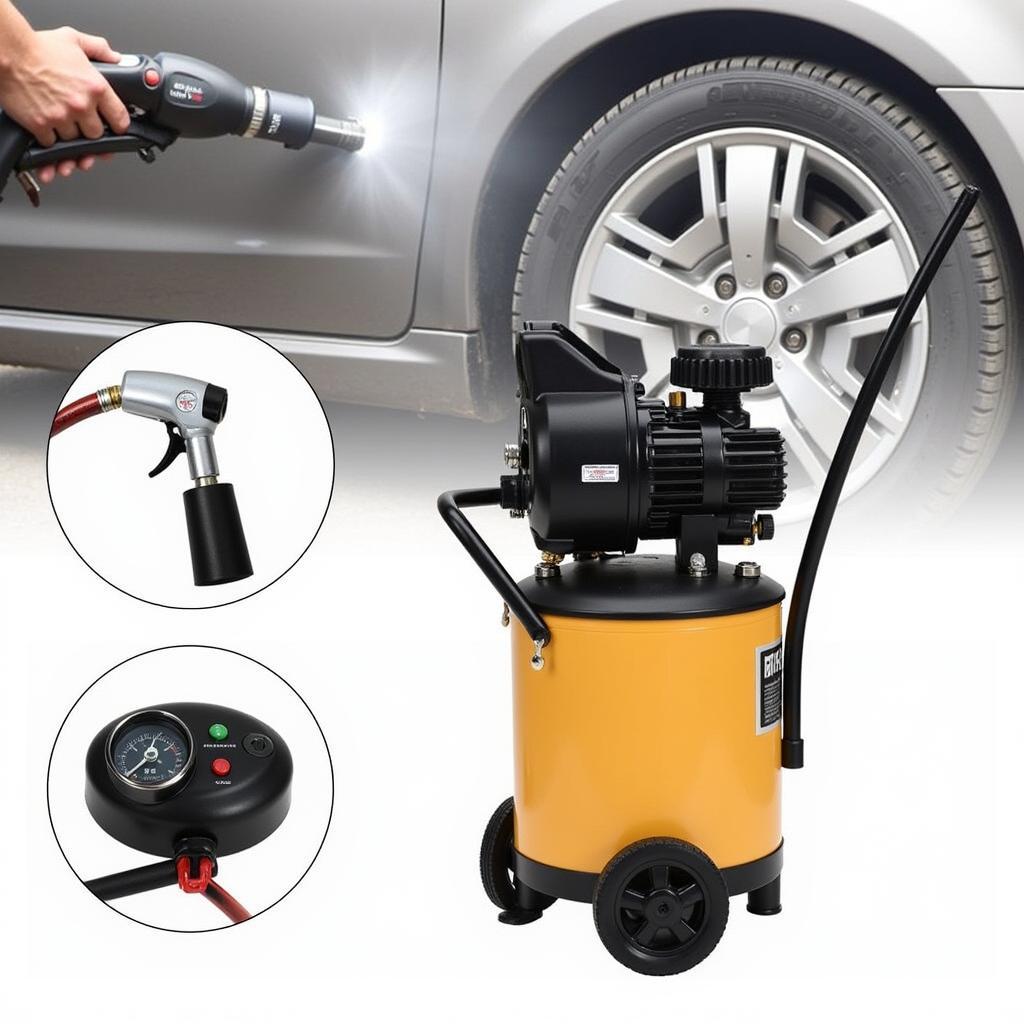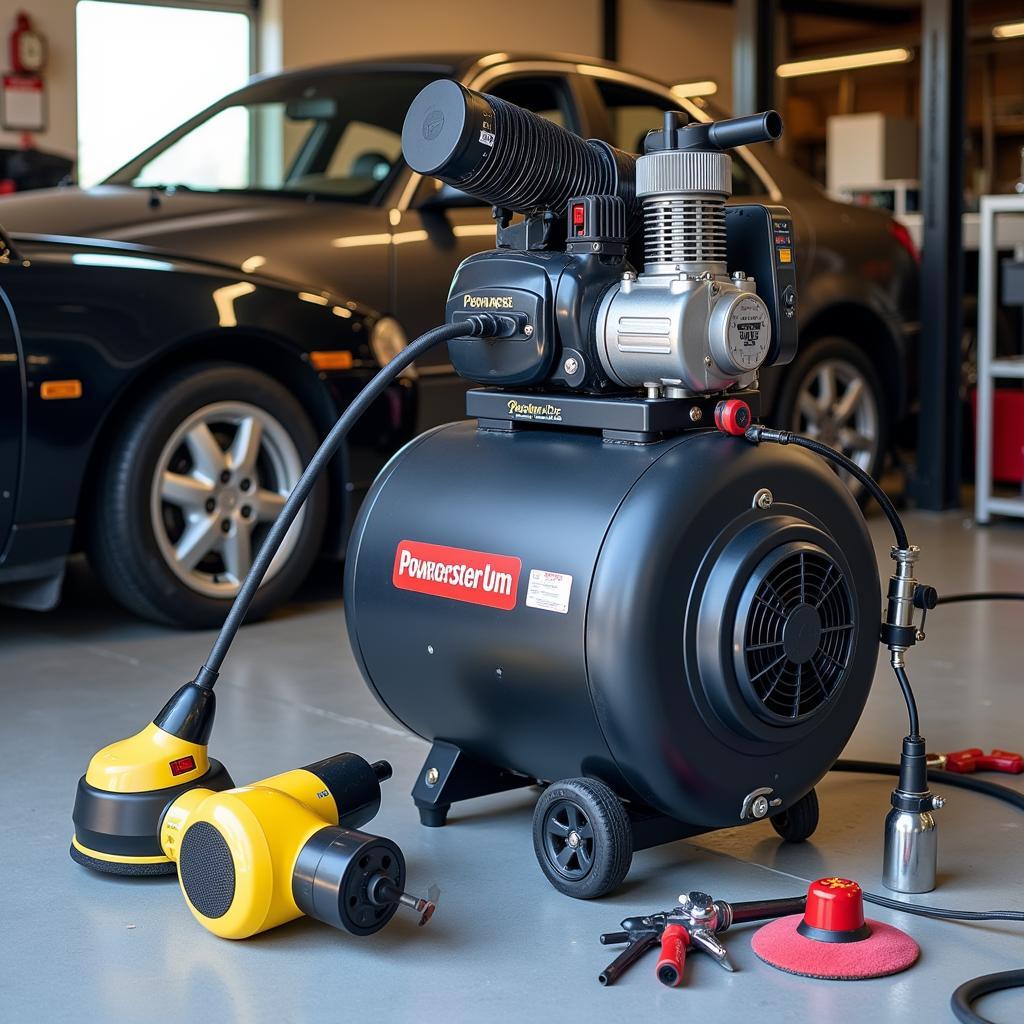Choosing the Best Air Compressor For Car Detailing can significantly elevate your detailing game. Whether you’re a professional detailer or a weekend warrior, having the right air compressor can make tasks like cleaning, drying, and applying coatings a breeze. This guide will help you understand the key factors to consider when selecting an air compressor for your car detailing needs.
For professional detailers, a powerful and reliable air compressor is an absolute must-have. It speeds up tasks, improves the quality of work, and ultimately boosts your bottom line. But even for car enthusiasts detailing their own vehicles, the right air compressor can make a world of difference. Having the best air compressor for car detailing transforms a laborious chore into an enjoyable and rewarding experience. Let’s delve into the specifics.
We’ll cover everything from tank size and CFM (Cubic Feet per Minute) to portability and noise levels, ensuring you’re equipped to make the best decision. Check out our guide on the best tools for detailing a car for a comprehensive overview of essential detailing equipment.
Understanding Your Car Detailing Air Compressor Needs
Before you jump into buying an air compressor, it’s crucial to understand your specific requirements. What types of detailing tasks will you be performing? How often will you be using the compressor? Answering these questions will guide you towards the right type and size of compressor.
What Size Air Compressor Do I Need for Car Detailing?
The size of the air compressor you need depends on the air tools you plan to use. For example, an air blower for drying requires less air than a dual-action polisher. Consider the CFM and PSI (Pounds per Square Inch) requirements of your tools to ensure compatibility. A higher CFM rating means the compressor can deliver more air, allowing you to use more powerful tools.
Portability vs. Power: Finding the Right Balance
If you’re a mobile detailer, portability is key. A smaller, lighter compressor will be easier to transport. However, these smaller units often have lower CFM ratings. If you need more power, you might consider a larger, stationary compressor for your workshop and a smaller, portable unit for mobile jobs. For more information on portable options, see our article on the best portable air compressor for car detailing tools.
 Portable Air Compressor for Car Detailing
Portable Air Compressor for Car Detailing
Key Features to Look For
There are several key features to consider when choosing the best air compressor for car detailing. These include:
- Tank Size: Larger tanks provide a longer run time before the compressor needs to cycle on again.
- CFM and PSI: Ensure the compressor’s output matches the requirements of your air tools.
- Noise Level: A quieter compressor is essential, especially if you’re working in residential areas.
- Duty Cycle: This refers to the percentage of time the compressor can run continuously. A higher duty cycle is ideal for extended detailing sessions.
- Durability and Reliability: Choose a well-built compressor from a reputable brand to ensure longevity.
“Investing in a high-quality air compressor is a smart move for any serious detailer,” says renowned detailing expert, David Miller. “It not only improves the efficiency of your work but also enhances the overall quality of your results.”
 Air Compressor with Detailing Tools
Air Compressor with Detailing Tools
Types of Air Compressors for Car Detailing
There are several types of air compressors available, each with its own advantages and disadvantages:
- Pancake Compressors: These are small, portable units ideal for light-duty tasks like inflating tires and using air blowers. They are typically oil-free, requiring less maintenance.
- Twin-Stack Compressors: These offer higher CFM and PSI than pancake compressors, making them suitable for more demanding tools.
- Hot Dog Compressors: Similar to twin-stack compressors, but with a vertical tank, saving space.
- Wheelbarrow Compressors: These are larger, more powerful units designed for heavy-duty use and are typically found in professional detailing shops. Need a robust solution? Explore our recommendations for the best air compressor for detailing cars.
“Choosing the right type of air compressor depends on the specific needs of your detailing business,” adds Sarah Johnson, a leading automotive consultant. “Consider factors like your workload, budget, and available space.”
Conclusion
Selecting the best air compressor for car detailing is a crucial investment for both professionals and enthusiasts. By considering your specific needs, understanding the key features, and exploring the different types available, you can find the perfect compressor to elevate your detailing game. Investing in the right equipment not only streamlines your workflow but also contributes to achieving professional-level results. For a comprehensive guide on essential detailing equipment, check out our article on the best tools for detailing car.
FAQ
- What is the ideal CFM for car detailing? The ideal CFM depends on the tools you use, but a minimum of 4 CFM is recommended for most detailing tasks.
- Is an oil-free compressor better for car detailing? Yes, oil-free compressors require less maintenance and eliminate the risk of oil contamination.
- How often should I drain the tank of my air compressor? Draining the tank after each use helps prevent moisture buildup and corrosion.
- Can I use a regular air compressor for car detailing? Yes, but ensure it meets the CFM and PSI requirements of your detailing tools.
- What is the average lifespan of a car detailing air compressor? With proper maintenance, a quality air compressor can last for several years.
- How loud is a typical car detailing air compressor? Noise levels vary, but look for compressors with lower decibel ratings for a quieter operation.
- What is the best air compressor for car detailing and cleaning? For a comprehensive comparison and recommendations, check out our dedicated guide on the best air compressor for car detailing and cleaning.
Need help choosing the perfect air compressor for your car detailing needs? Contact us via WhatsApp: +1(641)206-8880, or Email: [email protected]. Our 24/7 customer support team is ready to assist you.

Leave a Reply